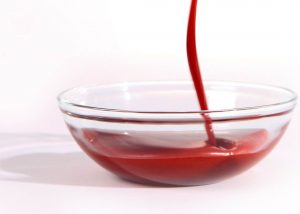Palm oil is the second largest consumed vegetable oil in the world and usually gotten from the palm tree (Elais guineensis) which is an ancient tropical plant native to many West African countries, where local populations traditionally use its oil for cooking and other purposes. Malaysia and Indonesia are currently the leading producers of Palm Oil, accounting for the 86% of global production; other Palm oil producing countries are Nigeria, Thailand, Colombia, Papa Guinea, Cote d’Ivoire, India and Brazil.
It is important not to confuse palm oil with palm kernel oil. Palm oil is gotten from the pulp of palm fruit while palm kernel oil is extracted from the seed of the palm fruit

Red palm oil also known as crude palm oil is converted to refined palm oil (which is usually colorless) through heating, bleaching, filtration, fractionation and deodorization. Here are the nutrient composition differences between red palm oil and refined palm oil
| Nutrients per 100g | Red Palm Oil | Refined Palm Oil |
| Fat | 100g | 100g |
| Total Saturated Fatty Acid | 44.4g | 49.9g |
| Total Monounsaturated Fatty Acid | 55.6g | 39.2g |
| Total Polyunsaturated Fatty Acids | – | 10.5g |
| Total carotenes (ug) | 500 – 700(90% alpha and beta carotenes | – |
| Tocopherols and tocotrienols (Vitamin E in ug) | 600 – 1000 (73% tocotrienols, 27% tocopherols) | ~50% loss |
The red palm oil is semi-solid at room temperature and reddish in color due to the presence of carotenoids and tocotreinols, which the human body converts to vitamin A and vitamin E respectively.

The crude (red) palm oil is very rich in antioxidants including vitamin E and provitamin A, these are nutrients that are already lost to processing in refined palm oil. Due to its high content of antioxidants , red palm oil has many health benefits:
Vitamin A deficiency is one of the most widespread nutritional deficiencies worldwide. Red palm oil is the richest naturally occurring source of beta-carotene, a carotenoid that the human body can convert into usable vitamin A (retinol). A review of key intervention studies in Africa, Asia, and Latin America in which red palm oil was used as a dietary supplement, in-home fortificant, to fortify foods used for distribution in targeted supplementary feeding programs, and to fortify staple food products shows that red palm oil is highly efficacious in improving vitamin A status among populations at risk of vitamin A deficiency.
Also, a randomized control trial by Georg Lietz et. al revealed that consumption of red palm oil increases concentrations of alpha- and beta-carotene in both breast milk and serum and maintains breast-milk retinol concentrations in a way similar to Sunflower oil. Breast-milk retinol might be maintained through increased dietary intake of these vegetable oils and use of mild cooking preparation methods (such as the addition of oil at the end of cooking and avoidance of frying).
A study carried out in Burkina faso also found that a low dose of red palm oil, taken regularly, improves vitamin A in individuals with deficiency.
Did I get a ‘really??’ Yes it does! Although intake of foods rich in saturated fatty acids have been linked to coronary heart diseases, recent reviews of research studies showed that saturated fatty acids in red palm oil does not elevate blood cholesterol which may be due to the positions of the fatty acids and its high content of provitamin carotenoids, vitamin E and other antioxidants as well as phytosterols. Palm oil has been found to reduce blood cholesterol when compared with the traditional sources of saturated fats such as coconut oil, dairy and animal fats. The high content of vitamin E tocotrienols are not only powerful antioxidants but also inhibit cholesterol synthesis. In studies where red palm oil was compared to soybean oil, to olive oil, to sunflower oil, and to canola oil, effects on lipid profile were similar (total cholesterol, low-density lipoprotein cholesterol, and high density lipoprotein cholesterol).
Brain tissue is highly susceptible to oxidative stress as it consumes an inordinate amount of oxygen to meet high metabolic demands, contains high concentrations of polyunsaturated fatty acids (PUFAs) that are vulnerable to lipid peroxidation, and has lower antioxidant capacity as compared to other organ systems. Recent studies show that palm oil–derived α-tocotrienol helps to protect the lipid-soluble vitamin in brain tissue and reduce the risk of neurodegeneration
The vitamin E content of red palm oil (30% tocopherols, 70% tocotrienols) has been extensively researched for its nutritional and health properties which includes anti-cancer effects. A number of epidemiological studies showed that higher blood level of vitamin A/ carotenoids reduces cancer risk. It has also been reported that palm carotenoids exhibit an inhibitory effect on the proliferation of a number of human cancer cells. Red palm oil was also found to aid in cancer management and to reduce the adverse effects of chemotherapy in animal studies showing that red palm oil supplementation during chemotherapy may confer protective effects in humans.
Although red palm oil contains highly bioavailable β-carotene and vitamin A and is reasonably stable to heat without any adverse effects, a particular study found that repeatedly heated palm oil increase lipid peroxidation and total blood cholesterol and may result in atherosclerosis. Feeding with fresh and once-heated palm oil does not cause any deleterious effect but repeatedly heated oil may be harmful because it causes oxidative damage thereby predisposing to atherosclerosis.
Red palm oil was also found to have a positive effect on immune function. The Vitamin A content of red palm oil plays a vital role in maintaining the body’s natural defenses involved in the production and function of white blood cells. This helps to reduce the risk of infections and also reduce the recovery period from infections. It was also found that countries where infections like measles and malaria are common, correcting vitamin A deficiency in children decreased the risk of dying from these diseases
Certain animal studies showed that red palm oil could increase antioxidant activity and improve sperm count and motility and protect epididymal sperm against damage from oxidative stress. Hence, incorporating red palm oil in the diet may be beneficial for men to combat adverse effects of oxidative stress, maintain sperm quality, and preserve fertility
When palm oil is consumed as part of a low-fat diet, it is effective in maintaining desirable plasma cholesterol and lipoprotein cholesterol levels. According to international guidelines, saturated fatty acids intake should be kept <10% of total energy, within a balanced diet; within these limits, no negative effect (specifically heart diseases and cancer risk) can be forseen.
https://www.ncbi.nlm.nih.gov/pmc/articles/PMC3065441/
https://www.ncbi.nlm.nih.gov/pubmed/12602939
https://www.ncbi.nlm.nih.gov/pubmed/28158744
https://academic.oup.com/nutritionreviews/article/75/2/98/2965109
https://www.ncbi.nlm.nih.gov/pubmed/29186779
https://www.ncbi.nlm.nih.gov/pubmed/14506001
https://www.ncbi.nlm.nih.gov/pubmed/20095133
https://www.ncbi.nlm.nih.gov/pubmed/29186779
https://www.ncbi.nlm.nih.gov/pubmed/28158744
https://www.healthline.com/nutrition/vitamin-a-benefits#section3
https://academic.oup.com/nutritionreviews/article/75/2/98/2965109
https://www.ncbi.nlm.nih.gov/pubmed/11566649
https://www.ncbi.nlm.nih.gov/pubmed/20823490
http://citeseerx.ist.psu.edu/viewdoc/download?doi=10.1.1.655.5312&rep=rep1&type=pdf
http://apjcn.nhri.org.tw/server/APJCN/11/s5/S433.pdf
https://www.ncbi.nlm.nih.gov/pubmed/1345319
https://www.tandfonline.com/doi/full/10.1080/09637486.2016.1278431?scroll=top&needAccess=true